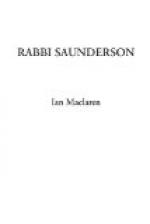lads insisted that it must be understood in the sense
of scholar, whereupon Saunderson disowned it on the
ground of his slender attainments. The lads
saw the force of this objection, and admitted that
the honourable word belonged by rights to MacWheep,
who was a “gude body,” but it was their
fancy to assign it to Saunderson—whereat
Saunderson yielded, only exacting a pledge that he
should never be so called in public, lest all concerned
be condemned for foolishness. When it was announced
that the University of Edinburgh had resolved to confer
the degree of D.D. on him for his distinguished learning
and great services to theological scholarship, Saunderson,
who was delighted when Dowbiggin of Muirtown got the
honour for being an ecclesiastic, would have refused
it for himself had not his boys gone out in a body
and compelled him to accept. They also purchased
a Doctor’s gown and hood, and invested him with
them in the name of Kilbogie two days before the capping.
One of them saw that he was duly brought to the Tolbooth
Kirk, where the capping ceremonial in those days took
place. Another sent a list of Saunderson’s
articles to British and foreign theological and philological
reviews, which filled half a column of the
Caledonian,
and drew forth a complimentary article from that exceedingly
able and caustic paper, whose editor lost all his
hair through sympathetic emotion the morning of the
Disruption, and ever afterwards pointed out the faults
of the Free Kirk with much frankness. The fame
of Rabbi Saunderson was so spread abroad that a great
cheer went up as he came in with the other Doctors
elect, in which he cordially joined, considering it
to be intended for his neighbour, a successful West-End
clergyman, the author of a Life of Dorcas and other
pleasing booklets. For some time after his boys
said “Doctor” in every third sentence,
and then grew weary of a too common title, and fell
back on “Rabbi,” by which he was known
until the day of his death, and which is now engraved
on his tombstone.
Saunderson’s reputation for unfathomable learning
and saintly simplicity was built up out of many incidents,
and grew with the lapse of years to a solitary height
in the big strath, so that no man would have dared
to smile had the Free Kirk minister of Kilbogie appeared
in Muirtown in his shirt-sleeves, and Kilbogie would
only have been a trifle more conceited. Truly
he was an amazing man, and, now that he is dead and
gone, the last of his race, I wish some man of his
profession had written his life, for the doctrine
he taught and the way he lived will not be believed
by the new generation. The arrival of his goods
was more than many sermons to Kilbogie, and I had
it from Mains’ own lips. It was the kindly
fashion of those days that the farmers carted the
new minister’s furniture from the nearest railway
station, and as the railway to Kildrummie was not yet
open, they had to go to Stormont Station on the north
line; and a pleasant procession they made passing
through Pitscowrie, ten carts in their best array,
and drivers with a semi-festive air. Mr. Saunderson
was at the station, having reached it, by some miracle,
without mistake, and was in a condition of abject
nervousness about the handling and conveyance of his
belongings.




